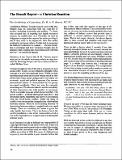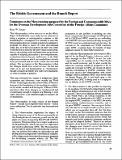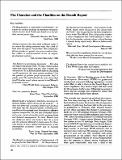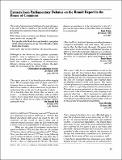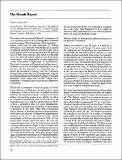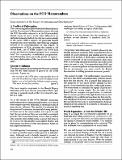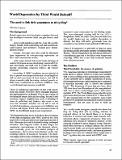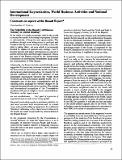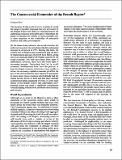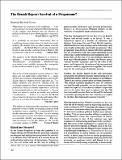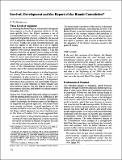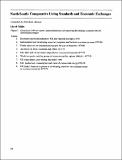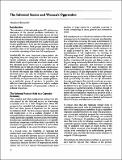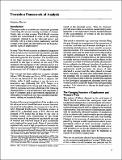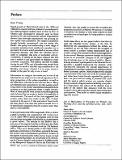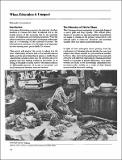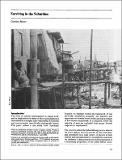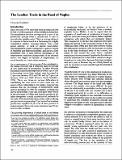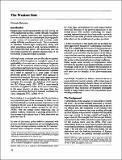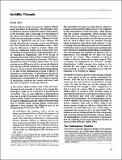1980 - 1989: Recent submissions
Now showing items 61-80 of 430
-
The Brandt Report—a Christian Reaction
(Institute of Development Studies, 01/04/1981)Summary Christians have an obligation to support the cause of the underprivileged and this means working for economic reform. Whether we like it or not we are obliged to think in international terms and resolve some of ... -
The British Government and the Brandt Report
(Institute of Development Studies, 01/04/1981)Summary The British Government's unimaginative response to the Brandt Report reflects the official view that no new ideas are needed in the field of overseas development. But the FCO Memorandum correctly points out the ... -
The Churches and the Charities on the Brandt Report
(Institute of Development Studies, 01/04/1981)Summary The public response in Britain to the Brandt Report has been remarkably strong. The Report's moral language and its argument for an equitable and secure world economy have acted as a rallying call for the development ... -
Extracts from Parliamentary Debates on the Brandt Report in the House of Commons
(Institute of Development Studies, 01/04/1981)Summary Extracts from speeches by Christopher Brocklebank?Fowler, Sir Ronald Bell, loan Evans, Peter Shore, Tom McNally, Sir Bernard Braine, Edward Heath, Dame Judith Hart, Eric Deakins, Clinton Davis, Gwyneth Dunwoody, ... -
The Brandt Report
(Institute of Development Studies, 01/04/1981)Summary The Brandt Report is coherent and well presented and it contains some important and substantive conclusions. The proposals on individual topics are summarised. But it is difficult to believe that much will change ... -
Observations on the FCO Memorandum society for International Development: Some members of the Society for International Development
(Institute of Development Studies, 01/04/1981)Summary The main thrust of present UK policies is not compatible with the Brandt Report, even though the FCO Memorandum is supportive of a number of issues presented therein. Inflation is a symptom rather than the cause ... -
World Depression by Third World Default?: The need to link debt guarantees to tri?cycling
(Institute of Development Studies, 01/04/1981)Summary Extrapolative optimism about the international financial market's ability to cope with developing countries' debt problems is false and dangerous. Governments must recognise the seriousness of the risk of default ... -
International Keynesianism, World Business Activities and National Development: Comments on aspects of the Brandt Report
(Institute of Development Studies, 01/04/1981)Summary The assumptions underlying the central Brandt Report proposal for massive transfer of resources from rich to poor countries are false and the political chances of their being introduced are minute. Interdependence ... -
The Controversial Economics of the Brandt Report
(Institute of Development Studies, 01/04/1981)Summary The economic principles underlying the Brandt Report are explained and evaluated. The Report uses a Keynesian model on a world scale, which fails to provide a clear explanation of the causes of inflation. The ... -
The Brandt Report: Survival of a Programme?
(Institute of Development Studies, 01/04/1981)Summary The opposition to the Brandt Report in Britain springs mainly from ideological differences with respect to the causes of the present crisis and the proper role of government in the economy, which are heightened ... -
Survival, Development and the Report of the Brandt Commission
(Institute of Development Studies, 01/04/1981)Summary The Brandt Report contains three levels of argument of increasing generality: the programme of recommendations (not further discussed); the framework for action; and the vision. The vision is a serious, even absurd, ... -
North?South: Comparative Living Standards and Economic Exchanges
(Institute of Development Studies, 01/04/1981) -
The Informal Sector and Women's Oppression
(Institute of Development Studies, 01/07/1981)SUMMARY The similarity between the debates about the informal sector, and about women in development, lies in the fact that both deal with the problem of economic discrimination based on impeded access to productive assets ... -
Towards a Framework of Analysis
(Institute of Development Studies, 01/07/1981)SUMMARY Using case studies from several Third World countries, this article argues that the concentration of women, particularly married women with young children, in the informal sector and the form their work takes are ... -
Preface
(Institute of Development Studies, 01/07/1981) -
When Education is Unequal
(Institute of Development Studies, 01/07/1981)SUMMARY This article discusses the various factors which account for the importance of women in the urban informal sector in Ghana Women find urban trading the most suitable occupation because the traditional division of ... -
Surviving in the Suburbios
(Institute of Development Studies, 01/07/1981)SUMMARY The form of women's participation in casual work and its implications in terms of their subordination is determined by a complex inter?relationship of economic and non?economic (specifically ideological) factors. ... -
The Leather Trade in the Bassi of Naples
(Institute of Development Studies, 01/07/1981)SUMMARY This article argues that outwork and the high incidence of small units of production in Italy must be contextualised within the process of decentralised production. In Naples men and women play different parts ... -
The Weakest Link
(Institute of Development Studies, 01/07/1981)SUMMARY In this article it is argued that the formal/informal dichotomy is not based on a classification of economic activities. It is rather a division between workers according to the nature of the labour contracts under ... -
Invisible Threads
(Institute of Development Studies, 01/07/1981)SUMMARY This article explores some aspects of the widespread, though largely invisible, labour of people (mainly women) working for wages in their own homes. It is argued that this labour is an essential part of capitalist ...

